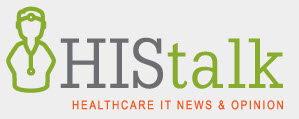
+- HIStalk Sponsor Announcements (https://histalk.com/forum)
+-- Forum: Sponsor News (https://histalk.com/forum/forumdisplay.php?fid=1)
+--- Forum: Announcements (https://histalk.com/forum/forumdisplay.php?fid=2)
+--- Thread: Survey: Physician I.T. Leaders Say Medication Management Makes Patients Safer. (/showthread.php?tid=488)
Survey: Physician I.T. Leaders Say Medication Management Makes Patients Safer. - Margaret Kelly - 09-07-2018
Survey: Physician I.T. Leaders Say Recent Improvements to Medication Management in Hospitals Make Patients Safer
CMIOs cite progress but also say health systems must adopt better technologies to address high drug costs and combat opioid abuse
ROCKVILLE, Md.— September 6, 2018—Nearly 100 percent of chief medical information officers (CMIOs) in U.S. hospitals believe medication management improvement initiatives are having a positive impact and that patient safety issues are less likely to occur today, as compared to 5 years ago, according to a new survey from the Association of Medical Directors of Information Systems (AMDIS). The survey of physician leaders, sponsored by DrFirst, also revealed that CMIOs believe there is more work to be done to address gaps that could potentially impact patient safety.
Among the top patient safety gaps identified by CMIOs is the “inability to prevent financial constraints” from impacting patients’ adherence to prescribed medications. In fact, 71 percent of the survey respondents cited concerns with the lack of price transparency—the ability to inform patients how much a prescribed medication will cost, including their insurance co-pay amount. Medication costs are a key concern for patients as well, as evidenced by a Truven Health Analytics-NPR Health Poll which found that 67 percent of patients who failed to fill their prescriptions in the last 90 days reported high costs as their reason.
Addressing high drug prices is also a priority for the Trump administration, which earlier this year introduced the American Patients First blueprint, a comprehensive plan to bring down prescription drug prices and out-of-pocket costs.
The surveyed CMIOS also identified a major gap related to the opioid epidemic. Sixty-five percent of respondents cited the need for an integrated clinician workflow that makes it easy for clinicians to coordinate the entire medication management process, including electronic prescribing of controlled substances like opioids, access to state Prescription Drug Monitoring Programs (PDMPs) to identify patients’ opioid histories, and electronic access to prescriptions from other providers and locations to avoid potentially harmful drug combinations. Similarly, 41 percent shared concerns about providers’ abilities to prevent opioid abuse since they often cannot easily distinguish “drug shoppers” from genuine patients.
Overall, 82 percent of surveyed CMIOs concur that medication management improvement initiatives have had a positive impact on adverse drug events. However, only half of the CMIOs expressed satisfaction with the medication management process, while 12 percent indicated dissatisfaction. According to the survey, the biggest gaps in the entire medication management process are incomplete patient medication histories (80 percent) and misaligned medication reconciliation and care transition cycles that lead to misinformed decisions by care teams (75 percent).
“While the industry has clearly made significant strides to improve medication management processes, CMIOs remain troubled by a number of gaps that compromise patient safety and quality outcomes,” said G. Cameron Deemer, president of DrFirst. “That’s why DrFirst has remained firmly committed to addressing these pain points with innovative new technologies that make a meaningful difference in patient care and the physician experience.”
He added, “By leveraging data and medication management technologies, including those that provide easy PDMP access and price transparency at the point of prescribing, care teams are better positioned to drive safer, more effective care—and increase medication adherence for patients across the country.”
Since DrFirst pioneered its drug pricing program two years ago, the company has performed more than 8 million transactions for over 33,000 providers, benefiting almost 1.4 million patients.
Additional key findings from the AMDIS survey include:
- · 91 percent of CMIOs say that the biggest gap in medication history adherence and monitoring is the lack of visibility into a patient’s medication adherence. In most cases, only pharmacies know whether a patient has filled a prescription.
- · 85 percent of CMIOs point to the lack of patient participation in the medication reconciliation process as the biggest gap for medication history availability in their organization.
- · CMIOs identified workflow variations across departments (91 percent), a lack of process buy-in and/or process compliance (77 percent), and a lack of process ownership (73 percent) as the top issues compromising patient safety.
- · Virtually all the surveyed CMIOs believe it is imperative to focus on the entire medication process when addressing patient safety concerns and process efficiencies; 95 percent also feel that reducing order entry and data validation burdens for pharmacy and clinical staff will enhance patient safety and process efficiencies.
DrFirst, the nation’s leading provider of e-prescribing and medication management solutions, enables stakeholders across the healthcare industry to use comprehensive real-time data and connectivity to increase their patient safety ratings, efficiency and profitability. Today, more than 170,000 healthcare professionals and more than 60% of electronic health record (EHR) vendors depend on DrFirst’s innovative software solutions to improve clinical workflows, expedite secure collaboration across a patient’s care team and drive better health outcomes. The company’s integrated technologies include its award-winning electronic prescribing platform, the most comprehensive medication history available, clinically specialized secure messaging, and patient medication adherence monitoring and benefits checking. In addition, DrFirst was the first to offer e-prescribing for controlled substances (EPCS) and is considered the industry standard for providers nationwide. For more information, please visit www.drfirst.com or connect with us @DrFirst.
DrFirst Media Contact:
Lisa Chernikoff
Amendola Communications
734-678-5513
lchernikoff@acmarketingpr.com